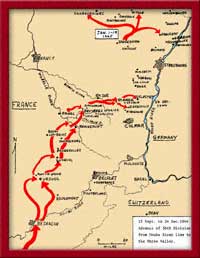
RHINELAND CAMPAIGN
MOSELLE RIVER OPERATION
 As the advance units of the German XIX Army
came into striking distance of Belfort Pass, effective elements of the Army, reinforced by
troops from northern France, began to make strong defensive stands. Although the Germans
evacuated Luxeuil-les-Bains, intense fighting occurred in wooded areas north and east of
town. Meanwhile, the short time they were in the vicinity of Luxeuil afforded many G.I.s
opportunity to enjoy luxurious hot sulphur water baths in huge aluminum tubs. They were
using baths which had been patronized back in the times of Julius Caesar. Here, too, a
French woman who had won gold medals in Paris for her lace work, brought out her cache of
work, hidden from the Germans, and in short order sold it all to the Americans. As the advance units of the German XIX Army
came into striking distance of Belfort Pass, effective elements of the Army, reinforced by
troops from northern France, began to make strong defensive stands. Although the Germans
evacuated Luxeuil-les-Bains, intense fighting occurred in wooded areas north and east of
town. Meanwhile, the short time they were in the vicinity of Luxeuil afforded many G.I.s
opportunity to enjoy luxurious hot sulphur water baths in huge aluminum tubs. They were
using baths which had been patronized back in the times of Julius Caesar. Here, too, a
French woman who had won gold medals in Paris for her lace work, brought out her cache of
work, hidden from the Germans, and in short order sold it all to the Americans.
At this time the 1st French Army was ordered to take over the attack toward Belfort
Pass and the VI Corps was directed to cross the Vosges Mountains into the Rhine Valley. It
soon became apparent that the reinforced enemy would make a stand at the Moselle River
crossing. As the 36th Division moved toward the Moselle at Remiremont, the 443rd Battalion
CP displaced forward to Fougerolles and found a barn for overnight shelter. Lt. Col.
Larson noticed a number of chickens around and had Capt. Fisher use his high school French
to persuade the farmer’s wife to bake a chicken for a dollar. Two hours later the
baked chicken arrived with head and entrails still in place. No one could summon the
courage to eat the chicken so Capt. Fisher had the task of explaining to the farmer’s
wife that she could keep both the chicken and the dollar.
Arriving in the Remiremont area on 20 September the three 36th Division Regiments
attacked the same night. Using a series of feints the 141st was able to cross the Moselle
north of town and enlarge its bridgehead by the next afternoon. German determination and
resistance was strong but the 142nd, in house-to-house fighting, forced the Germans to
flee at daybreak on 23 September, destroying a bridge over the Moselle as they left. That
same morning Platoons A-1, B-2 and C-1 engaged two ME-109s and shot one down. By then,
large enemy reinforcements had begun to appear on the Division’s right flank and the
brilliant, rapid advance from the Southern France beachhead slowed considerably.
|